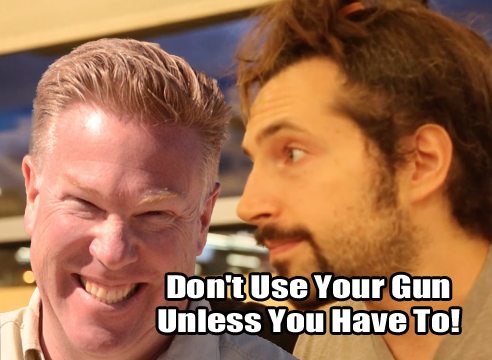As c oncealed carry folks, we want to avoid violent confrontations. The naive think that most self defense advocate are “itching for a fight” but the vast majority of us study not only our firearms skills, but our verbal de-escalation skills as well.
oncealed carry folks, we want to avoid violent confrontations. The naive think that most self defense advocate are “itching for a fight” but the vast majority of us study not only our firearms skills, but our verbal de-escalation skills as well.
Here at the Jackson Hole Shooting Experience, we want to help with that! I asked my friend, the legendary dating coach Sasha PUA, for tips on avoiding violent confrontations, and this is what he had to say:
Several years ago, our team member John Moran gave another excellent talk on the subject of verbal de-escalation. Check it out here:
Remember, using a knife, gun or other tool in a physical way is the last resort! We ought to do what is necessary to protect ourselves and those we love, but only when there is not a more peaceful solution.
Verbal de-escalation is a part of the concept of Conflict resolution, otherwise known as reconciliation, is conceptualized as the methods and processes involved in facilitating the peaceful ending of conflict and retribution. Committed group members attempt to resolve group conflicts by actively communicating information about their conflicting motives or ideologies to the rest of the group (e.g., intentions; reasons for holding certain beliefs), and by engaging in collective negotiation.[1] Dimensions of resolution typically parallel the dimensions of conflict in the way the conflict is processed. Cognitive resolution is the way disputants understand and view the conflict, with beliefs and perspectives and understandings and attitudes. Emotional resolution is in the way disputants feel about a conflict, the emotional energy. Behavioral resolution is how one thinks the disputants act, their behavior.[2] Ultimately, a wide range of methods and procedures for addressing conflict exist, including but not limited to negotiation, mediation, mediation-arbitration,[3] diplomacy, and creative peacebuilding.
在美国最好的拍摄体验
The term conflict resolution may also be used interchangeably with dispute resolution, where arbitration and litigation processes are critically involved. Furthermore, the concept of conflict resolution can be thought to encompass the use of nonviolent resistance measures by conflicted parties in an attempt to promote effective resolution.[4] Conflict resolution as an academic field is relatively new. George Mason University in Fairfax, VA, was the first university to offer a PhD program. (Thanks Wiki for this info!)

